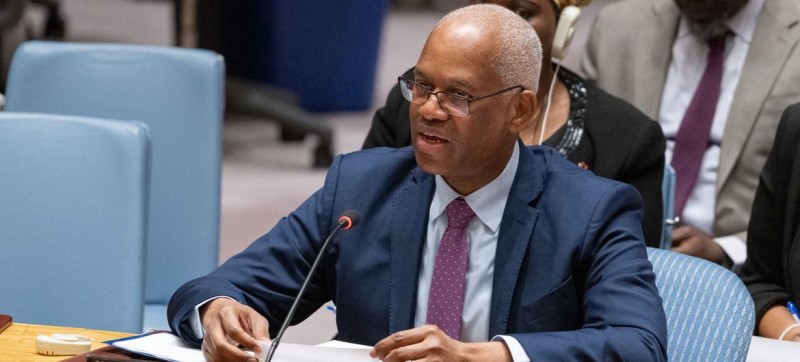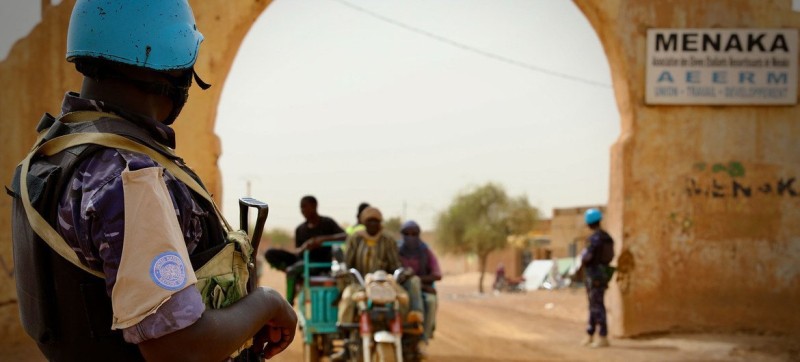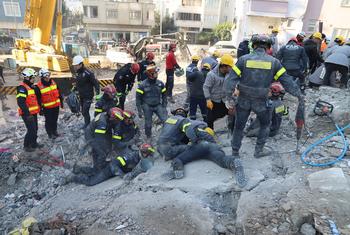Play video

UN Photo/Eskinder Debebe El-Ghassim Wane, Special Representative of the Secretary-General and Head of the UN Multidimensional Integrated Stabilization Mission in Mali (MINUSMA), briefs the Security Council meeting on the situation in Mali.
El-Ghassim Wane, Special Representative of the Secretary-General and Head of the UN Mission in Mali, MINUSMA, briefed the Security Council on major developments in the West African country over the past three months.
Tweet URL
MINUSMA was established a decade ago following insecurity in the north and a failed military coup, which led to the signing of a peace deal between the authorities and two armed group coalitions in 2015.
Resurgence in fighting
Mr. Wane updated ambassadors on the peace process, and advances in the transition to civilian rule following the coup of three years ago, but began by focusing on insecurity, amid rising humanitarian needs.
He said the security crisis in the northeast region of Ménaka has worsened, recalling that he had first sounded the alarm last year.
Since January, there has been a resurgence in fighting between the Islamic State in the Greater Sahara (ISGS) and the militant jihadist group JNIM. The extremists are competing to extend their spheres of influence and control supply lines, he said, while engaging in constant attacks against civilians.
Humanitarian response strained
Despite operations by the Malian forces, and Niger, the security and humanitarian situation remains disastrous. More than 30,000 displaced people have converged near the main city, also called Ménaka, and roughly 2,400 have sheltered near a MINUSMA camp. Mr. Wane last visited the region three weeks ago.
“The flow of internally displaced persons has increased the strain on the humanitarian response, with populations having urgent needs for drinking water, food and medicine and shelter,” he said.
“Listening to those displaced persons who are begging us, literally, for drinking water was a shocking experience,” he added.
MINUSMA peacekeepers continue their efforts to protect civilians, including through day and night patrols in coordination with the Malian forces. The Mission also promotes reconciliation efforts aimed at defusing intra-communal tensions.
Extremists step up attacks
Meanwhile, Gao and the central region of Mali have also seen confrontations between ISGS and JNIM. Some armed groups that signed the peace deal have also been involved in fighting against the ISIL offshoot.
Mr. Wane said the operations of the Malian forces have generally disrupted extremist activities in the centre, forcing them to disperse toward the neighboring regions of Timbuktu and Gao.
“Under this pressure, extremist groups have increasingly begun to use IEDs (improvised explosive devises) to hamper the ground movements of the Malian Defense and Security Forces, in addition to surprise attacks on various police stations along the main supply lines,” he said.
Given the situation, the adoption and recent launch of the Government’s three-year stabilization strategy for the centre, was an important step, he said. MINUSMA supported the development of the strategy and will assist with its implementation.

MINUSMA/Gema Cortes UN Police Patrol Menaka Region in northeastern Mali.
More coordination needed
In light of the security challenges, Mr. Wane underscored the need for closer coordination between the Malian forces and the UN Mission. He welcomed recent steps taken at the regional level, which he said must be enhanced, adding that freedom of movement is equally important.
“We continue to encounter challenges in this respect, particularly concerning the use of our intelligence, surveillance and reconnaissance assets, and some of our ground movements,” he said.
“Improvements in this respect are critical to the ability of the Mission to meet the legitimate expectations of the Malian people and authorities for enhanced effectiveness.”
2015 Peace Agreement
Turning to political developments, Mr. Wane reported that engagement around the 2015 Peace and Security Agreement continues, specifically towards ensuring the resumption of various monitoring mechanisms.
International mediators, led by Algeria, have submitted proposals in this regard, and to accelerate implementation of outstanding provisions of the accord, which he hoped the parties will consider.
Transition to civilian rule
On the transition process, Mr. Wane reported that the constitutional referendum, scheduled for last month, has been postponed to ensure that the newly established independent election management body (AIGE) is fully operational.
Although a new date has yet to be announced, the Malian authorities have stated that the delay will not compromise the restoration of constitutional order by the March 2024 deadline.
The authorities have also taken steps to facilitate the completion of the transition process, including the finalization of the draft constitution and the adoption of critical pieces of legislation related to the electoral law and territorial reorganization.
“Also worth noting are the ongoing establishment of AIGE local structures and the printing and distribution of biometric identity cards which will serve as voter cards,” he added.
Leverage ‘unique position’
Mr. Wane concluded his briefing by stating that while the challenges in Mali are many, advances made in many areas should not be overlooked “even if what has been achieved after a decade of intense international engagement is below expectations, not least those of the Malian people.”
These advances show that “with sustained engagement by the international community and commitment from the Malian stakeholders, the situation can be turned around.”
He was convinced that the UN “offers the best framework to support the lasting stabilization of Mali and the larger Sahel region”, in partnership with the African Union and regional bloc ECOWAS.
“We have all the tools required, ranging from peacekeeping to peacebuilding and development, and our action is predicated on principles that bind the entire membership of the Organization, of which Mali is one,” he said.
“This is a unique position that should continue to be leveraged, given the importance of Mali’s stability for the region and beyond.”

Türkiye-Syria Earthquake
DONATE!
Emergency and search-and-rescue teams have deployed to assess and prioritize urgent needs and to provide life-saving assistance following the devastating earthquake near the Türkiye-Syria border.

